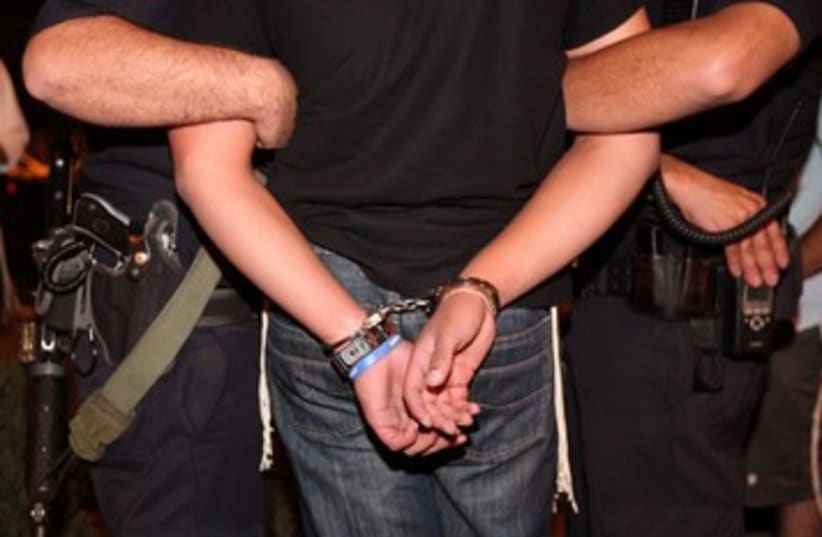Yitzhak Abergil dedicated the last nine years to the massive trial against him and his associates.
Case 512, the prosecution and police's flagship case ended definitively last week when the Supreme Court rejected the appeal of Abergil and several of his co-defendants against their conviction in the Tel Aviv District Court.
Abergil, now 55, was convicted of murder, attempted murder, leading a criminal organization, and drug importation and trafficking, receiving three life sentences plus 22 years, 11 of which will be served consecutively to the life sentences.
A man who spent his youth in and out of prison, repeatedly managed to outsmart law enforcement through sophistication and personal charm, who terrorized the criminal underworld and led Israel's most powerful crime organization with worldwide reach, is expected to spend the rest of his life in prison.
His massive empire, which generated tens of millions in profits, has collapsed, and almost all his partners are currently imprisoned. Abergil himself, according to someone familiar with the details, has been left all but penniless, tired, and exhausted from the prolonged legal battle and lengthy imprisonment.
However, despite being perceived as having lost his power, the assessment is that he still has the ability to regain strength and orchestrate criminal events both inside and outside prison.
For this reason, he is held in the secure wing of Shata Prison in a cell with two other inmates who were carefully vetted by the Prison Service and are not identified as rivals or part of Abergil's coalition. Last year, he briefly shared a cell in Sharon Prison with his son born out of wedlock, Shlomi Saada, who was arrested and convicted for involvement in an attempted murder of a criminal with whom he had a dispute.
Saada was sentenced to five years in prison, and he no longer serves in the same cell as his father, as part of a policy led in the past year by Prison Service Commissioner Major General Kovi Yaakovi, aimed at weakening crime organizations and diminishing them as much as possible so that they won't have influence inside and outside prison.
Among other things, it was discovered that the two were exploiting their status and benefits received to pass messages to their operatives outside for carrying out criminal activities.
As a result of Yaakovi's policy, crime organizations within prisons have been significantly weakened in recent months, including Yitzhak Abergil's, and there has been a decrease in incidents originating from prison.
As part of the policy, there are no more privileges for senior criminals in prisons compared to other inmates; everyone gets what they deserve, and equal treatment, and anyone who breaks the rules is immediately severely punished, including denial of various conditions and even solitary confinement.
Abergil, who knows he faces many more long years in prison, especially now after his appeal was rejected, understands well that it's better for him to follow the rules; otherwise, he has much to lose. He is considered an inmate who doesn't cause problems and mainly wants to be allowed more frequent visits from close family.
Colonel Shmulik Lavi, the Prison Service's Northern District commander, has known Abergil for years.
"There are inmates who are placed in secure wings to distance them from the ability to carry out negative events. When we identify an inmate or detainee who has such power, regardless of which organization they're from, they will stay in the secure wing," Lavi explained in a conversation with Walla.
"The meaning is that they receive the minimum. For example, only visits from first-degree relatives and limited phone calls. If they commit a disciplinary offense, they go to solitary confinement. We don't allow them to connect with other criminals. For dominant inmates known to have capability and influence outside, we ensure they are disconnected as much as possible and verify that in their place of imprisonment, they don't generate incidents. We maintain full control to thwart incidents."
Abergil's crime empire grew and developed to massive dimensions from 2002-2006. The organization, headed by Abergil, managed an extensive logistics network spanning continents, including operations in Belgium, Spain, Japan, Canada, Australia, and Israel.
The primary oxygen pipeline that enabled the financing and creation of the organization's infrastructure and its transformation into a multi-tentacled monster was the embezzlement of money from Trade Bank totaling about 250 million shekels, which Etti Alon stole from Trade Bank customers where she worked and transferred to crime organizations to cover her brother Ofer Maximov's gambling debts.
The assassination of Yaakov Abergil
That's what police estimated then, but Abergil and his organization were ultimately not charged in this case. Everything actually began with the 2001 assassination of Yaakov Abergil, Yitzhak's brother.
The assassination was a signal for the start of a bloody war between various crime organizations, with Yitzhak, the younger brother, seeing his main rival, Zeev Rosenstein, as the one who ordered the hit.
In 2002-2003, Israel Police dealt with a series of murders and violence between criminals, with the peak occurring in 2002 in the criminal bombing on Yehuda Halevi Street in Tel Aviv, when during an attempt to assassinate Rosenstein using an explosive device, three innocent civilians were killed. Dozens were injured, including Rosenstein and his bodyguards.
In addition to the attempts on Rosenstein's life, criminals Felix Abutbul was eliminated in his Prague casino and Hanania Ohana in Ganei Tikva. These cases remain unsolved to this day, but police believe Yitzhak Abergil gave the orders.
Regarding the criminal bombing of Yehuda Halevi, Abergil was charged with the murder of three innocent civilians only 13 years later as part of the indictment in Case 512. He was, as known, convicted of their murders and sentenced to three life sentences.
To calm the situation, police strongly advised Abergil to leave the country. He went into exile and dedicated this period to strengthening his crime organization's status and building the empire that made him Israel's number one criminal and one of the five largest drug cartels in the world, as defined by the British Guardian newspaper in 2013.
He occasionally came for visits to Israel, and during each such visit, police were on alert. During one visit in July 2008, an assassination attempt occurred on Bat Yam beach, where a civilian, Margarita Lautin, was murdered in front of her daughter.
Police arrested Abergil but failed to gather incriminating evidence against him.
After about a month in detention, investigators were about to release him for lack of choice, but then a request came from U.S. authorities for the extradition of Yitzhak Abergil and his brother Meir, on suspicion of murder, extortion, drug trafficking, and money laundering. The request fell into the hands of authorities here like ripe fruit.
Five years earlier, Zeev Rosenstein had also been extradited to the United States, and police hoped that the extradition of the two brothers would create quiet.
In January 2011, the Abergil brothers were extradited and put on trial in the United States. Meir signed a plea deal and was sentenced to three years in prison, most of which he had served during his detention, so he returned to Israel immediately after. Yitzhak was sentenced to eight and a half years in prison.
After several years, he requested to return to Israel and serve his sentence here. He didn't know that at this stage, police investigators were nearing the end of an extensive, worldwide investigation against him and his organization, during which a series of substantial evidence was collected against him.
Upon his return, Case 512 blew up.
The covert investigation, conducted by the International Crime Unit for almost a decade, became overt with the arrests of dozens of his organization's members. Abergil was arrested on suspicion of murder, attempted murder, leading a criminal organization, and drug importation and trafficking.
In this case, which ultimately led to the dismantling of Israel's number one crime organization, indictments were eventually filed against 18 people, including Abergil himself, his right-hand man Avi Ruhan, and his brother Meir. The latter was sentenced to three years in prison, and in June '21, he was released after serving two and a half years.
Since then, Meir has kept a low profile and avoided criminal involvement. Against Yitzhak, Avi Ruhan, and other organization members, seven former members of Abergil's organization testified, whom the police managed to recruit as state witnesses.
In the verdict at the Tel Aviv District Court, the presiding judge, Judge Gilia Ravid, wrote, "It has been proven before us that we are dealing with a powerful crime organization that extended its reach in Israel and abroad, including many activists who were organized in subgroups and operated for years as an independent and sustainable system... The organization had a hierarchical structure, divided into groups that operated in different strongholds in the country under the leadership of a group head... The organization members had different roles and specializations. Each operated within their role to promote criminal activity and maximize the organization's profits."
Regarding Yitzhak Abergil, she added, "It has been proven that he stood at the head of the organization and ruled it without constraints. Everything was done according to his word. He directed the organization's activities and defined its objectives. The organization's reputation was the reputation of the one who headed it. His power, dominance, the respect he commanded, and his being the undisputed ruler of the organization."
Today, Abergil's organization is no longer declared a criminal organization. As mentioned, Case 512, led by prosecutor Nissim Marom, led to the organization's dismantling, with almost all of Abergil's members and partners behind bars. Some of his major rivals, like Asi Abutbul, are also there.
The fact that police managed to recruit state witnesses from within the organization itself who testified about the activities and incriminated its leaders caused internal distrust and further accelerated the organization's weakening.
A former police source estimated that many of Abergil's connections have loosened and weakened as he was busy with the legal battle and that those he still maintains are mainly in Israel and not worldwide, as was the case before Case 512 exploded.
However, the vacuum created in the criminal underworld with the organization's dismantling has led to the entry of new criminal forces, the strongest of them from the Arab sector. This is now the police's main arena in their war against crime organizations.

